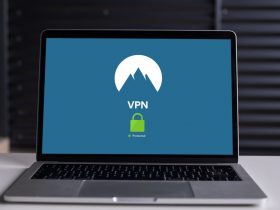
Your privacy is a right, but it’s not a given. More often than not, people will put their interests first and infringe on your rights to serve their own agenda. For instance, a website you visit may look at your browsing patterns to serve custom-tailored ads, and your ISP may look into your browsing history to satisfy the government’s demands, etc. If you want to protect your privacy, it’s important to realize that no one will do it for you. In other words, the burden lies on you.
As luck would have it, there are several tools available that make the job easier. Roughly speaking, they fall into one of the following categories:
1. VPN
In the current day and age, when the traditional office is gradually moving into a virtual environment, the significance of treating sensitive work-related data with care is paramount. Knowing what a VPN is, is one of the cybersecurity essentials. In essence, using one allows you to connect to the internet without anyone being able to snoop on your data. The encrypted tunnel that gets established between the client and the server acts as a much-needed protective barrier when you’re afraid someone could be eavesdropping on data you send through unprotected Wi-Fi networks. It also hides your IP, so others will have a more challenging time tracking your online activities.
2. 2FA
Two-factor authentication (or 2FA for short) is a method designed for protecting your accounts from unauthorized use. By turning in on, anyone trying to log in will be asked to present another form of authentication in addition to the password. This could be something as simple as a randomly generated code sent to your mobile device every time you attempt to log in. If an unauthorized individual succeeded in stealing your password, they still wouldn’t be able to get in without also stealing your phone; a feat that’s almost impossible to achieve without having physical access to it.
3. Password Manager
Having to remember so many passwords can be a burden on your memory. Due to this, many people make the mistake of simplifying them or re-using them, both of which are a big no-no when it comes to cybersecurity. After all, you don’t want to make the hackers’ job too easy, do you? Using a password manager is a great solution that addresses such problems and allows you to keep your passwords complex and varied. All it takes is remembering one master password to access the others, and you’re all set.
4. Private Search Engines
It’s hard to imagine, but there are numerous alternatives to Google, although the latter seems to be receiving the lion’s share of all the web traffic. One such example is DuckDuckGo, and it’s of significant relevance due to being a privacy-oriented alternative. For starters, this search engine does not store your IP or store any user-related information. While Google is willing to share anonymized browsing data with other interested third parties such as advertisers, DuckDuckGo makes it a point not to do the same.
5. Messenger With End-to-End Encryption
If you send messages containing potentially sensitive content, you need to take measures to prevent them from getting into the wrong hands. As hackers are always on the lookout for what they can either steal or use against you, a messenger with end-to-end encryption acts as an additional barrier to overcome. In case you’re unfortunate enough to be living in a country that stifles free speech, this type of messaging software will also prevent the government from meddling in your affairs. Journalists have been known to use it for reporting, but anyone is entitled to using it without explaining.
Conclusion
With the right knowledge and education, you can take the steps necessary toward protecting your online privacy. These tools are at your disposal, and they will help you get on the right path. Even so, never forget that your online safety comes down to your common sense and wits – no online tools can ever replace it.






Leave a Reply